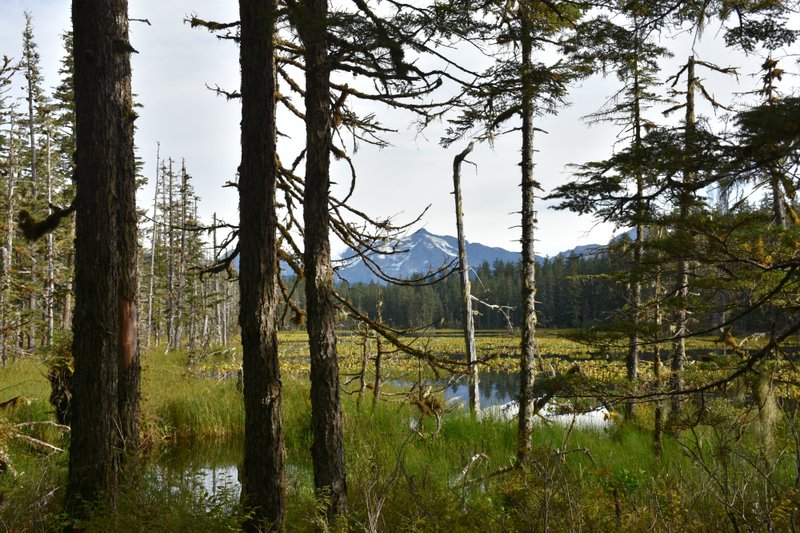WASHINGTON -- President Donald Trump has instructed Agriculture Secretary Sonny Perdue to exempt Alaska's 16.7 million-acre Tongass National Forest from logging restrictions imposed nearly 20 years ago, according to three people briefed on the issue, after privately discussing the matter with the state's governor aboard Air Force One.
The move would affect more than half of the world's largest intact temperate rain forest, opening it up to potential logging, energy and mining projects. It would undercut a policy of President Bill Clinton's administration known as the "roadless rule" that has survived a decades-long legal assault.
Trump has taken a personal interest in "forest management," a term he told a group of lawmakers last year he has "redefined" since taking office.
Politicians have tussled for years over the fate of the Tongass, an expansive stretch of southeastern Alaska with old-growth spruce, hemlock and cedar, rivers running with salmon, and dramatic fjords. Clinton put more than half of it off-limits to logging just days before leaving office in 2001, when he barred the construction of roads in 58.5 million acres of undeveloped national forest across the country. George W. Bush sought to reverse that policy, holding a handful of timber sales in the Tongass before a federal judge reinstated the Clinton rule.
Trump's decision to weigh in, at a time when Forest Service officials had planned much more modest changes to managing the agency's single largest holding, revives a battle that the previous administration had aimed to settle.
In 2016, the agency finalized a plan to phase out old-growth logging in the Tongass within a decade. Congress has designated more than 5.7 million acres of the forest as wilderness, which must remain undeveloped under any circumstances.
Timber provides a small fraction of southeast Alaska's jobs -- just under 1%, according to the regional development organization Southeast Conference, compared with seafood processing's 8% and tourism's 17%.
But Alaskans, including Republicans Gov. Michael Dunleavy and Sen. Lisa Murkowski, have pressed Trump to exempt their state from the roadless rule, which does not allow roads except when the Forest Service approves specific projects. It bars commercial logging.
In a statement, Murkowski said all of Alaska's elected officials have sought to block the roadless rule.
"It should never have been applied to our state, and it is harming our ability to develop a sustainable, year-round economy for the Southeast region, where less than one percent of the land is privately held," she said. "The timber industry has declined precipitously, and it is astonishing that the few remaining mills in our nation's largest national forest have to constantly worry about running out of supply."
Alaskans have found a powerful ally in the president. Speaking to reporters on June 26, after meeting with Trump during a refueling stop at Elmendorf Air Force Base, Dunleavy said of the president, "He really believes in the opportunities here in Alaska, and he's done everything he can to work with us on our mining concerns, timber concerns; we talked about tariffs as well. We're working on a whole bunch of things together, but the president does care very much about the state of Alaska."
Trump expressed support for exempting the Tongass from the roadless rule during that conversation with Dunleavy, according to three people who spoke on the condition of anonymity to discuss internal deliberations. Earlier this month, Trump told Perdue to issue a plan to that effect this fall, the sources said.
It is unclear how much logging would take place in the Tongass if federal restrictions were lifted, since the Forest Service would have to amend its existing management plan to hold a new timber sale. The 2016 plan identified 962,000 acres as suitable for commercial timber cutting and suggested no more than 568,000 acres of that should be logged.
John Schoen, a retired wildlife ecologist who worked in the Tongass for the Alaska Department of Fish and Game, co-wrote a 2013 research paper finding that roughly half of the forest's large old-growth trees had been logged last century. The remaining big trees provide critical habitat for black bear, Sitka black-tailed deer, a bird of prey called the Northern goshawk and other species, he added.
Trump has frequently talked with his advisers about how to manage the nation's forests, and signed an executive order last year aimed at increasing logging by streamlining federal environmental reviews of these projects.
White House and Agriculture Department officials referred questions this week to the Forest Service, which declined to comment. But the three people who spoke on the condition of anonymity said it was forging ahead with an exemption at Perdue's instructions.
Chris Wood, president of Trout Unlimited, joined with local business owners, conservation and outdoors groups in urging federal officials to make more limited changes to the rule. He said the shift could jeopardize the region's commercial, sport and subsistence salmon fishing industry.
About 40% of wild salmon that make their way down the West Coast spawn in the Tongass: The Forest Service estimates that the salmon industry generates $986 million annually.
Wood, who worked on the Clinton rule while at the Forest Service, said that in recent years agency officials have "realized the golden goose is the salmon, not the trees."
Business on 08/29/2019
